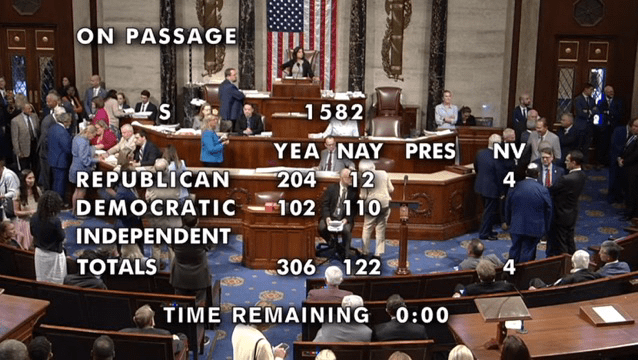
The GENIUS Act becomes the first law for digital currencies in the United States after passing in the House of Representatives
The GENIUS bill passes in the House of Representatives, becoming the first law for digital currencies in the United States.
The law sets strict rules for stablecoin issuers: reserves, audits, registration.
Implementation begins in 2026, reshaping the stablecoin landscape.
The U.S. House of Representatives passes the GENIUS Act and officially sends it to President Trump, who is expected to sign it immediately. The bill received strong bipartisan support, with 306 votes in favor.
This makes the GENIUS Act the first federal law for digital currencies in U.S. history. It establishes national standards for the issuance and oversight of stablecoins.
The GENIUS Act for regulating stablecoins finally passes
The GENIUS bill requires stablecoin issuers to maintain 100% reserves, undergo regular audits, and register with federal or state regulatory authorities. It also prohibits unsupported algorithmic stablecoins.
It importantly presents a dual licensing framework—granting federal and state authorities the power to approve and oversee issuers.
Lawmakers passed the bill with strong bipartisan support. It was approved by the Senate earlier this month, making today's House vote the final hurdle.

The U.S. House of Representatives passes the GENIUS bill for stablecoins
The Trump administration helped broker the deal during the political standoff this week. The legislation was passed shortly after the CLARITY Act progressed through the House.
With Trump expected to sign today, the law will take effect in 2026. Agencies like the Fed and OCC will now draft implementation rules.
This represents a turning point for the digital currency sector. Now, regulated stablecoins in the United States have a legal foundation for growth—with safety and transparency safeguards.
However, critics warn that the law may stifle smaller issuers and bolster major players like Circle and PayPal. Privacy advocates also raise concerns about surveillance risks.
However, the GENIUS Act now forms the regulatory backbone for dollar-backed stablecoins—a crucial part of broader digital currency adoption.
What's next:
-Trump will sign the law within hours.
-Regulatory agencies will issue rules by 2026.
-Stablecoin issuers must begin preparing for compliance immediately.
